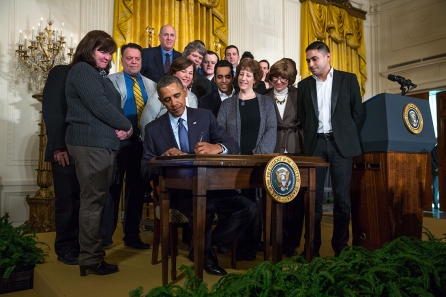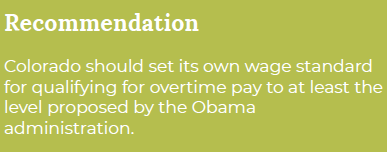Reform of Overtime Rules Blocked
 A federal judge in Texas recently struck down the Obama administration’s rule reforming overtime pay. The Trump administration had earlier told the court it intended to craft a new rule that would likely set the wage threshold for automatic overtime pay at a salary level lower than Obama did.
A federal judge in Texas recently struck down the Obama administration’s rule reforming overtime pay. The Trump administration had earlier told the court it intended to craft a new rule that would likely set the wage threshold for automatic overtime pay at a salary level lower than Obama did.
This means fewer salary workers will be paid overtime for the work they do beyond 40 hours per week, making it harder for lower- and middle-income workers to get ahead.
The federal Fair Labor Standards Act (FLSA) requires most workers in the U.S. be paid a minimum wage and, when they work more than 40 hours in a week, be paid overtime at a rate of one and half times (time and a half) their regular pay.
Related: Colorado Work Policies: Adapting How We Work
Currently, only 9.5 percent of workers nationally and 7.7 of Colorado workers automatically qualify for overtime pay based on their salaries compared to 62 percent who qualified in the 1970s. Among those most helped nationally by these rules are workers with less than a high school diploma, only a high school diploma, and those with some college.
The Obama administration set the weekly salary standard at $913 or $47,476 for a full-time, year-round worker. According to analysis by the Economic Policy Institute (EPI) this change would’ve made approximately 12.5 million workers, or 32.7 percent of the salaried workforce nationally, automatically eligible for overtime pay because they earned less than the new salary standard. That’s close to the 1975 standard after adjusting for inflation.
Related: Guide to Economic Mobility in Colorado
Raising this standard would mean a lot of low- to middle-income workers such as assistant managers in fast food restaurants or retail stores would get paid time and a half for the hours they work over 40 in a week. Many currently work 60-70 hours a week and receive no additional pay for those extra hours. Changing the overtime rule would boost their pay and/or result in a more reasonable work schedule.
If the federal government fails to act, Colorado could set its own standard for qualifying for overtime. EPI’s analysis shows, currently, 80,000 salaried workers, or 7.7 percent of Colorado’s salaried workforce, are covered under the current wage standard. If we set the standard at the rate proposed by the Obama administration, $913 per week, an additional 248,000 salaried workers in Colorado would automatically qualify for overtime pay bringing the total number covered to 328,000 salaried workers. This represents 31.7 percent of our salaried workforce.

Salaried workers who earn less than the standard would automatically qualify for overtime pay resulting in a boost to their pay for the hours they work over 40 hours per week. Rather than pay overtime, employers could raise the salaries of executive, administrative and professional employees above the new limit, which also boost their pay. Employers could also decide to reduce workers’ hours, thus giving them needed time off to spend with their families or on other activities. This could potentially lead to employers hiring additional workers to meet demand, thus boosting employment.
